#Theban princess
Explore tagged Tumblr posts
Text

José Ribelles y Helip (Spanish, 1778-1835) Antigone and Oedipus, n.d. Real Academia de Bellas Artes de San Fernando
#José Ribelles y Helip#spanish art#rome#neoclassical#Theban princess#spanish#western civilization#1700s#art#fine art#european art#classical art#europe#european#oil painting#fine arts#europa#mediterranean#hispanic#latin#artwork#spanish neoclassical#painting#oedipus and antigone#oedipus#antigone#mythological art#neoclassical art#neoclassicism#1800s
35 notes
·
View notes
Text
Mythology Olympics tournament round 1
Propaganda!
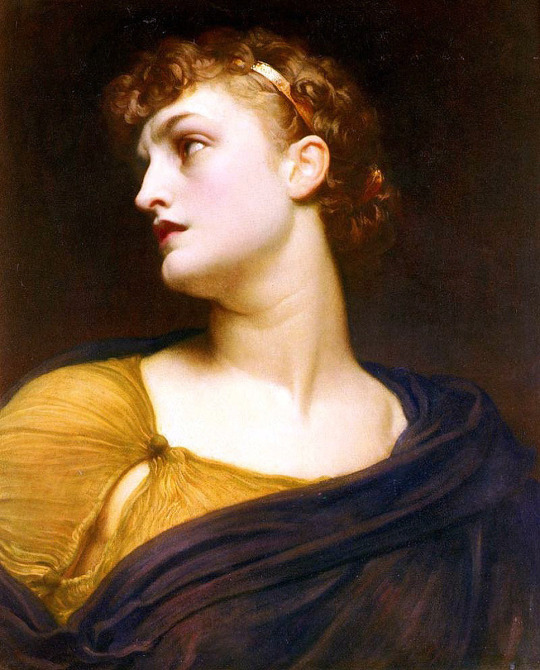
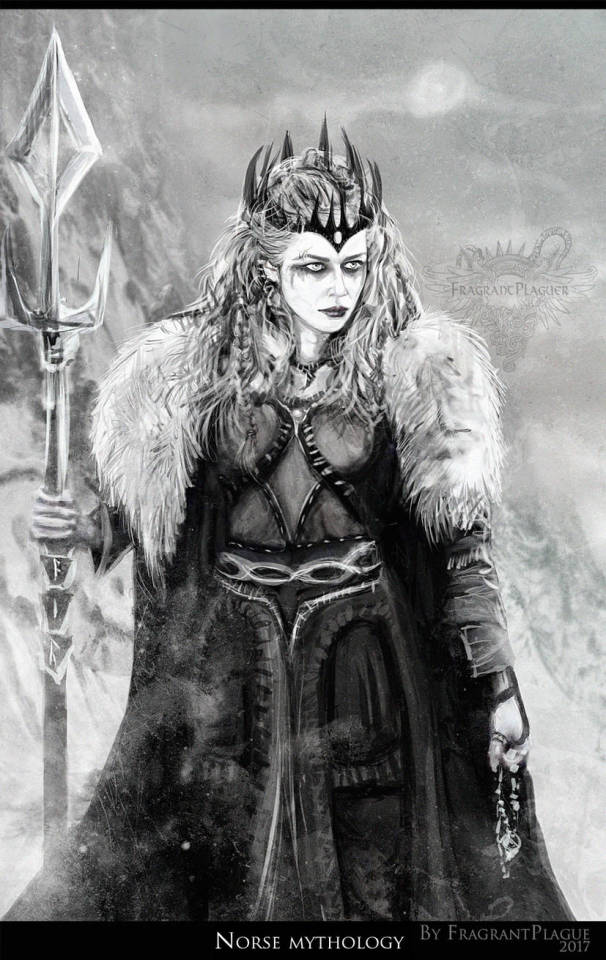
In Greek mythology, Antigone is a Theban princess and a character in several ancient Greek tragedies. She is the daughter of Oedipus, king of Thebes; her mother is either Jocasta or, in another variation of the myth, Euryganeia. She is a sister of Polynices, Eteocles, and Ismene. The meaning of the name is, as in the case of the masculine equivalent Antigonus, "in place of one's parents" or "worthy of one's parents". Antigone appears in the three 5th century BC tragic plays written by Sophocles, known collectively as the three Theban plays, being the protagonist of the eponymous tragedy Antigone.
Angrboða (also Angrboda) is a jötunn in Norse mythology. She is the mate of Loki and the mother of monsters. She is only mentioned once in the Poetic Edda (Völuspá hin skamma) as the mother of Fenrir by Loki. The Prose Edda (Gylfaginning) describes her as "a giantess in Jötunheimar." Her name has been translated as 'the one who brings grief', 'she-who-offers-sorrow', or 'harm-bidder'. The first element is related to the English word "anger", but means "sorrow" or "regret" in Old Norse, the later meaning is retained in Scandinavian languages. [art credit]
#antigone#angrboða#angbroda#angbrotha#poll#polls#tumblr poll#tumblr polls#tournament poll#wikipedia#mythology#mythology tournament#greek#classical greece#ancient greece#greek mythology#greece#norse mythology
190 notes
·
View notes
Text
The Strange Things with the Thebans...
I promised you guys that I'll make an essay about it so let's get it started.
Chapter I: Cadmus & The Dragon
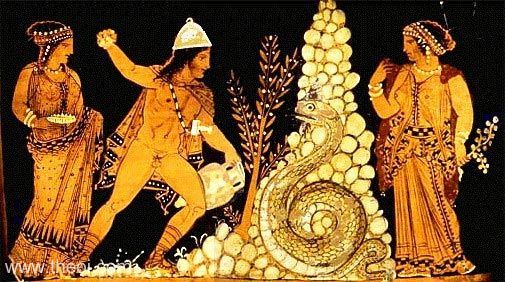
One of the greatest heroes before Heracles alongside Perseus and Bellerophon, Cadmus is the mythological founder king of Thebes. One interesting fact about him is that, despite of being considered a greek hero, Cadmus wasn't even greek in the first place. In fact he was phoencian and came from a city called Tyre. By ancient standards he would've been considered a "barbarian". Another irony is that Cadmus' initial purpose wasn't even to become a king, but to rescue his sister Europa, at that time kidnapped by Zeus in the shape of a bull. A further irony: Europe was named after an asian princess. Aaand another further irony: when the modern state of Hellas/Greece joined the European single currency, and so abandoned the drachma of old, it celebrated its accession and new monetary union by striking a coin bearing the image of Zeus disguised as a bull in the act of abducting (a polite way of masking the actual fact of rape) Europa.
Anyway, back to Cadmus: Once arrived in Boetia he intended to sacrifice a cow to Athena and asked his men to fetch water from the river. There was one single, little, tiny, itsy-bitsy problem though: the said river was guarded by the Ismenian Dragon, who also happened to be Ares' son. So Cadmus, just like any other hero, slayed the dragon and, listening to Athena's advice, planted the serpent's teeth. Out of these teeth a bunch of dudes grew up and started to fight (and consequently kill) each other, with the exception of five who survived: Echion, Udaeus, Chthonius, Hyperenor, and Pelor, who are now considered the ancestors of thebans. (Okay, the question now would be with whom they reproduced, but that's an ask even I don't want to know the answer to...).
Pseudo-Apollodorus, Bibliotheca 3. 22 (trans. Aldrich) (Greek mythographer C2nd A.D.) : "[Kadmos (Cadmus)] sent some of his men to fetch water from the spring of Ares, but a Serpent, said by many to be a child of Ares, guarded the spring and destroyed most of those who had been sent. In outrage Kadmos killed the Serpent, and then, following the instructions of Athena, planted its teeth. From this sowing there sprang from the earth armed men, called Spartoi (Sparti). These proceeded to kill each other, some in voluntary encounters, and others in ignorance. Pherelydes says that when Kadmos saw the armed men growing up from the earth, he threw stones at them, and they, believing that they were being hit by each other, started their fight... As for Kadmos, to atone for the deaths he served Ares as a laborer for an 'everlasting' year, for a year then was equal to eight years now."
Cadmus was punished for slaying the dragon by serving Ares for a certain period of time. Later, Athena assigned to him the government of Thebes and Zeus gave him Harmonia as his wife. Found another irony: Harmonia was the daughter of Ares, which makes him and Cadmus in-laws. Irony number five million: despite of being married with the personification of harmony herself, Cadmus' family tree is characterized by an entire disharmony. According to Statius, Harmonia received from Hephaestus a cursed necklace that brought unluck, which later got passed from one generation to another:
Statius, Thebaid 2. 265 ff (trans. Mozley) (Roman epic C1st A.D.) : "The dread necklace of Harmonia... The Lemnian [Hephaistos], so they of old believed, long time distressed at Mars' [Ares'] deceit and seeing that no punishment gave hindrance to the disclosed armour, and the avenging chains removed not the offence [of his affair with Hephaistos' then wife Aphrodite], wrought this [a cursed necklace] for Harmonia on her bridal day to be the glory of her dower [description of the necklace follows]... The work first proved its worth, when Harmonia's complaints turned to dreadful hissing, and she bore company to grovelling Cadmus, and with long trailing breast drew furrows in the Illyrian fields [the pair were turned into serpents in Illyria]. Next, scarce had shameless Semele [their daughter] put the hurtful gift about her neck, when lying Juno [Hera] crossed her threshold. Thou too, unhappy Jocasta, didst, as they say, possess the beauteous, baleful thing, and didst deck thy countenance with its praise - on what a couch, alas! to find favour; and many more beside. Last Argia shines in the splendour of the gift, and in pride of ornament and accursed gold surpassed her sister's mean attiring. The wife of the doomed prophet [Eriphyle wife of Amphiaraus] beheld it, and at every shrine and banquet in secret cherished fierce jealousy, if only it might be granted her to possess the terrible jewel, nought profited, alas!"
Cadmus and Harmonia left Thebes after a series of catastrophes which happened in their family and emmigrated to Illyria where they battled various local tribes to found a new kingdom. Eventually, they two got turned into snakes and carried off to the Elysium to live a peaceful life.
Pseudo-Apollodorus, Bibliotheca 3. 39 : "Kadmos (Cadmus) and Harmonia left Thebes and went to the Enkhelean (Enchelean) people. They were being harassed by the Illyrians, and learned from the god through an oracle that they would overpower the Illyrians if they had Kadmos and Harmonia as their leaders. Trusting this, they made these two their leaders in the campaign, and did indeed defeat the Illyrians. Kadmos ruled the Illyrians, and fathered a son named Illyrios, Later on, both he and Harmonia were turned into serpents, and were sent by Zeus out to the Elysian field."
Chapter 2: Semele Thyone
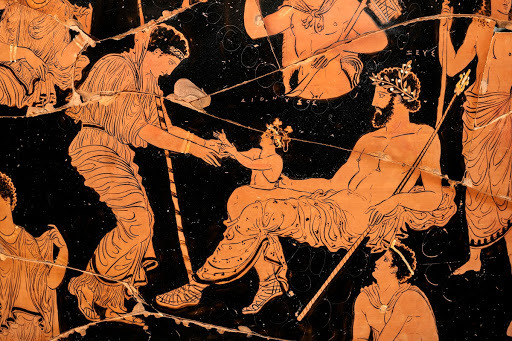
Semele: the youngest daughter of Cadmus and Harmonia and mother of Dionysus, and the theban princess infamously known for her not-so-bright intellectual capabilities.
Zeus slept with Semele and left her pregnant. Later, Hera payed her a visit disguised as her nurse and told her to ask Zeus to come to her in the same way he's coming to his wife (gotta admit, I didn't expect Hera to be this horny...). Later, Semele got killed by Zeus for her mistake, and Zeus managed to rescue the fetus she was carrying in her womb and let it develop inside his thigh.
Pseudo-Apollodorus, Bibliotheca 3. 26-27 (trans. Aldrich) (Greek mythographer C2nd A.D.) : "Zeus fell in love with Semele and slept with her, promising her anything she wanted, and keeping it all from Hera. But Semele was deceived by Hera into asking her to come to her as he came to Hera during their courtship. So Zeus, unable to refuse her, arrived in her bridal chamber in a chariot with lightning flashes and thunder, and sent a thunderbolt at her. Semele died of fright, and Zeus grabbed from the fire her sixth-month aborted baby, which he sewed into his thigh. After Semele's death the remaining daughters of Kadmos (Cadmus) circulated the story that she had slept with a mortal, thereafter accusing Zeus, and because of this had been killed by a thunderbolt."
Pseudo-Hyginus, Fabulae 179 : "Jove [Zeus] desired to lie with Semele, and when Juno [Hera] found out, she changed her form to that of the nurse Beroe, came to Semele, and suggested that she ask Jove to come to her as he came to Juno, ‘that you may know,’ she said, ‘what pleasure it is to lie with a god.’ And so Semele asked Jove [Zeus] to come to her in this way. Her request was granted, and Jove, coming with lightning and thunder, burned Semele to death. From her womb Liber [Dionysos] was born. Mercury [Hermes] snatched him from the fire and gave him to Nysus to be reared. In Greek he is called Dionysus."
Years later Dionysus rescued her from the Underworld. She was made immortal and received the name Thyone:
Pseudo-Apollodorus, Bibliotheca 3. 38 (trans. Aldrich) (Greek mythographer C2nd A.D.) : "He [Dionysos] retrieved his mother [Semele] from Haides' realm, gave her the name Thyone, and escorted her up to the sky."
Chapter 3: The Bacchae
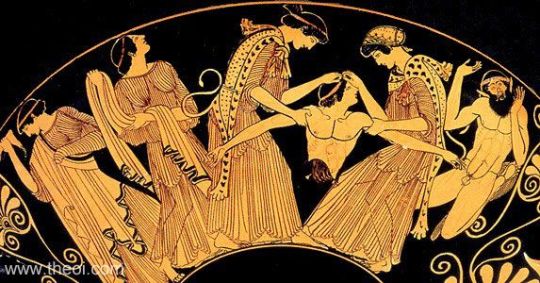
"He is life's liberating force. He is release of limbs and communion through dance. He is laughter, and music in flutes. He is repose from all cares -- he is sleep! When his blood bursts from the grape and flows across tables laid in his honor to fuse with our blood, he gently, gradually, wraps us in shadows of ivy-cool sleep."
Thebes was closely associated with a particular shape-shifting, cross-dressing, gender-bending deity: Dionysus. Despite the fact that Thebes worshipped Dionysus even ahead of Apollo, according to Euripides' Bacchae his first visit to Thebes didn't go very well. Tragedy. Madness. Homocide. Maternal felicide. Dismemberment. Decapitation. Suicide ensued. Word Abuse.
Dionysus returns to Thebes followed by the Maenads in order to clear his mother's name and punish the thebans for not worshipping him. He disguises himself as a mortal and induces madness in all the women of Thebes, who flee to Mount Kytheron to celebrate rituals in honor of the god. Dionysus' aunts, Semele's sisters Ino, Autonoe, and Agave, are also charmed into becoming members of the Dionysian cult. In the court of the Theban palace, Cadmus and his advisor, Tiresias, prepare to join the Maenads. They are stopped by the arrival of the king of the city, Pentheus, back from his travels in Thebes. Son of Agave and Echíon, Pentheus is enraged by the condition of the Thebans and orders the immediate capture of Dionysus.
The king's messengers return bringing the god. Pentheus comes out of the palace and questions the young leader of the debauchery. Dionysus presents himself as a believer of the son of Zeus, inviting the king to join the rite. In response, Pentheus orders his confinement in a stable. The chorus mourns the prisoner, but is a few moments later the palace is engulfed in flames, and collapsed by a strong earthquake.
Dionysus emerges unscathed from the wreckage and is reunited with his maenads. Pentheus receives news from a messenger, who informs him about the situation of the maenads in the forests. They nurse wolf cubs, cast spells, and are possessed of unimaginable strength, which they use in killing herds of cows and bulls, and in attacking villages. Dionysus, still in disguise, convinces the king to abandon his plan of punishing the women by brute force. He advises him to spy on them first by dressing up as a maenad and pretending to be part of the group. Pentheus is slowly hypnotized by the god's influence and approves of the plan.
A messenger arrives to report that once the party reached the mountain, Pentheus wanted to climb a tree to get a better view, and the stranger used divine power to bend the tree and place the king in its highest branches. Dionysus revealed himself, summoned his followers and sued the intruder. The maddened maenads, led by Agave, brought Pentheus down from the tree, tore off his limbs and head, and tore his body to pieces.
Agave arrives home, carrying her son's bloody head. In her state of divine bliss, she thinks she holds the head of a mountain lion. She proudly shows it to her father, Cadmus, and is confused by his horrified expression. Agave calls Pentheus to come and marvel as well. Then the madness begins to fade, and Cadmus forces her to admit that she killed her own son. At the end of the play Pentheus' corpse is reassembled, Agave and her sisters are sent into exile, and Dionysus decrees that his grandparents, Cadmus and Harmonia, will be turned into serpents.
Chapter 4: Actaeon & his Hounds
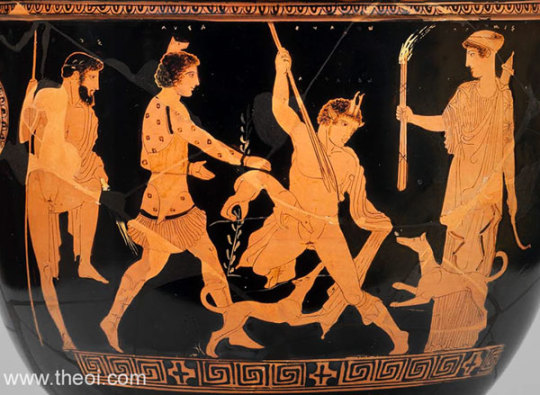
Actaeon, son of Autonoe and Aristaeus as well as a theban prince and skillful hunter, is known for a) either intentionally or accidentally seeing Artemis bathing and b) getting turned into a deer and then flayed by his hounds. Was it worth it, Actaeon? Was it?!
Pseudo-Apollodorus, Bibliotheca 3. 30 (trans. Aldrich) (Greek mythographer C2nd A.D.) :
"To Autonoe and Aristaios was born a son Aktaion, who was reared by Kheiron and trained as a huntsman, but was later eaten up on Kithairon by his own dogs [because] . . . he saw Artemis bathing. They say that the goddess changed him on the spot into a deer, and drove his fifty hunting dogs into a frenzy so that they unintentionally ate him. When he was no more, they looked for their master with great howls and bays, coming in the course of their search to Kheiron's cave. He made a likeness of Aktaion, which assuaged their grief."
Chapter 5: Leucothea & Palaemon
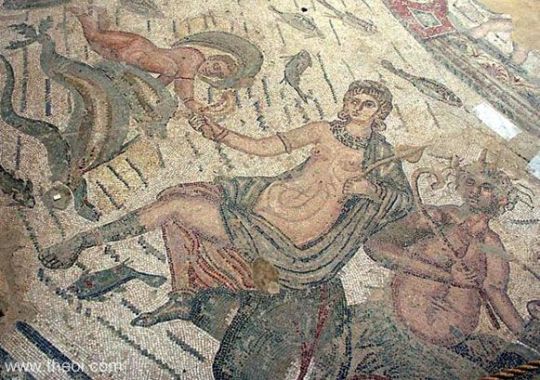
Ino married Athamas and gave birth to two sons, Learchus and Melicertes. After Hera found out they accepted to take care of infant Dionysus she inflicted both of them with madness. Athamas slew Learchus, whereas Ino grabbed Melicertes and leapt off a cliff into the sea. They were later welcomed by the sea gods and received the names Leucothea and Palaemon.
Pseudo-Apollodorus, Bibliotheca 3. 28 : "Zeus... gave birth to Dionysos, whom he entrusted to Hermes. Hermes took him to Ino and Athamas, and persuaded them to bring him up as a girl. Incensed, Hera inflicted madness on them, so that Athamas stalked and slew his elder son Learkhos (Learchus) on the conviction that he was a dear, while Ino threw Melikertes (Melicertes) into a basin of boiling water, and then, carrying both the basin and the corpse of the boy, she jumped to the bottom of the sea. Now she is called Leukothea (Leucothea), and her son is Palaimon (Palaemon): these names they receive from those who sail, for they help sailors beset by storms."
Chapter 6: The Sphinx
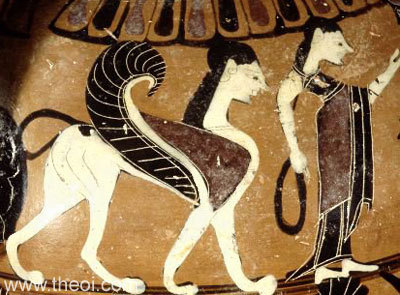
The Sphinx was a woman-headed winged lion infamously known for asking people the same riddle (and eventually turning them into dinner for giving her the wrong answer): "What is it that has one voice, and is four-footed and two-footed and three-footed?"
The origins of the Sphinx and the reason why she was sent to plague Thebes differ from one from one source to another. According to Pseudo-Apollodorus Hera sent her to Boetia as a punishment towards the Thebans for not having Lains punished, who had carried off Chrysippus from Pisa:
Pseudo-Apollodorus, Bibliotheca 3. 52 - 55 (trans. Aldrich) (Greek mythographer C2nd A.D.) : "While he [Kreon (Creon)] was king, quite a scourge held Thebes in suppression, for Hera sent upon them the Sphinx, whose parents were Ekhidna (Echidna) and Typhon. She had a woman's face, the breast, feet, and tail of a lion, and bird wings. She had learned a riddle form the Mousai (Muses), and now sat on Mount Phikion (Phicium) where she kept challenging the Thebans with it.
According to a Scholia on Hesiod's Theogony though it was Dionysus who sent her, whereas according to Euripides' Phoenicians she was either sent by Ares as a punishment for Cadmus, by Hades, or she was in fact one of Cadmus' daughters who was thrown into madness and went through a metamorphosis. Luckily it looked more like one of Ovid's Metamorphoses rather than Kafka's Metamorphosis, though after she started to eat people she certainly became a parasite. *badum tss*
Anyway, what is certain though is that she went through an existential crisis and killed herself after Oedipus managed to respond correctly to her riddle.
Chapter 7: Oedipus Rex
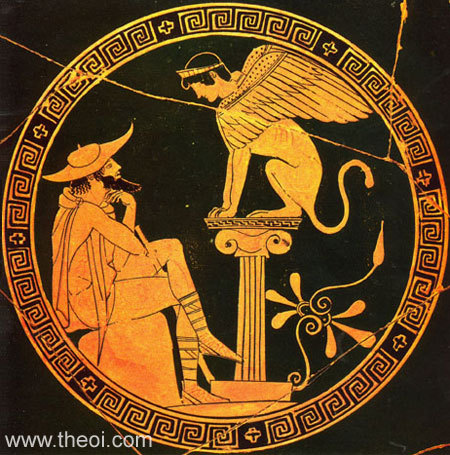
"And as for this marriage with your mother— have no fear. Many a man before you, in his dreams, has shared his mother’s bed. Take such things for shadows, nothing at all— Live, Oedipus, as if there’s no tomorrow."
Cadmus and Harmonia's only son, Polydorus, had a son named Labdacus who had a son named Laius who had a son named Oedipus; also known as the original motherfu-
The most famous myth version of Oedipus is the play Oedipus Rex or Oedipus Tyrannos, written by Sophocles.
The tragedy begins with the turmoil of the city of Thebes, which was facing a torment: the plants, animals and women were barren, and the plague made countless victims. The Thebans cane to ask Oedipus, the king of Thebes for help, who also got rid of the Sphinx by answering the Sphinx's riddle correctly. Creon, Oedipus' brother-in-law, is sent to the oracle to find out why this misfortune has befallen Thebes. The oracle reasons that the death of Laius, Oedipus' predecessor, has not been atoned for. In order to find out who killed Laius, Oedipus requests to be asked Tiresias, the old blind prophet. Tiresias tells Oedipus that he is the murderer of Laius. Believing that Tiresias and Creon have plotted against him, Oedipus argues with them. His wife, Jocasta, with whom he has four children, two boys - Eteocles and Polynices - and two girls, Antigone and Ismene, reassures him by telling him that Laios has been foretold that he will be killed by his own son, whom they gave for adoption in another country to avoid this tragedy. At that moment, Oedipus remembers the reason why he came to Thebes: to get away from his family so as not to kill his father, as he was told at birth. At a crossroad, Oedipus had a conflict with a group of robbers, thus killing his father, disguised as not to be recognized as the king. Oedipus then suffers a nervous breakdown, gouging out his own eyes since he believed that they are the ones that caused him not to see the truth.
Chapter 8: Seven Against Thebes
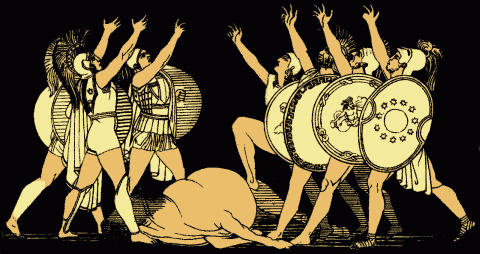
Another tragic episode from Thebes was the myth of the seven heroes who made war on this city, after the king of Argos chose them as captains of an army whose purpose was to restore Oedipus' son Polynices to the Theban throne. The myth is recounted in the play with the same name written by Aeschylus.
Seven Against Thebes opens with Eteocles calling forth every man in the city, whether child or aged, to the fight and the threat, which is at hand. Everyone must be ready to defend the city in battle. At that moment, the Scout enters with news that the enemy is just outside the walls and is preparing for battle. There are seven commanders ready to attack the seven gates of Thebes. After delivering the news, the Scout departs, and Eteocles prays to Zeus for his favor in the battle to come. The Chorus, which has entered as the Scout has related his news, begins a lament as they hear the approach of the armies. They beg their gods to protect them and their city. Eteocles hears the Chorus’ fearful pleadings as he enters and chastises them for their fear, which he says will not help their beloved Thebes. Instead, Eteocles promises that the Chorus will be stoned to death for their mindless fear, as their fear will incite the city’s residents into an instinctive fear of their own, which will disable and defeat the city. But the Chorus is not appeased, and they continue with their warnings as Eteocles warns them of the risk they create with their wailing. Eteocles again warns the Chorus to remain inside and to hold back their panic. At their continued warnings and fearful exclamations, Eteocles responds with attacks on the nature of women, their weaknesses, and their fears. Finally the Chorus promises to restrain their fear and remain silent, and Eteocles again prays to the gods, with promises of sacrifices and trophies if Thebes is successfully defended. After Eteocles leaves the stage, the Chorus continues to voice their worry at the coming battle and the risk they face if they are taken and become slaves.
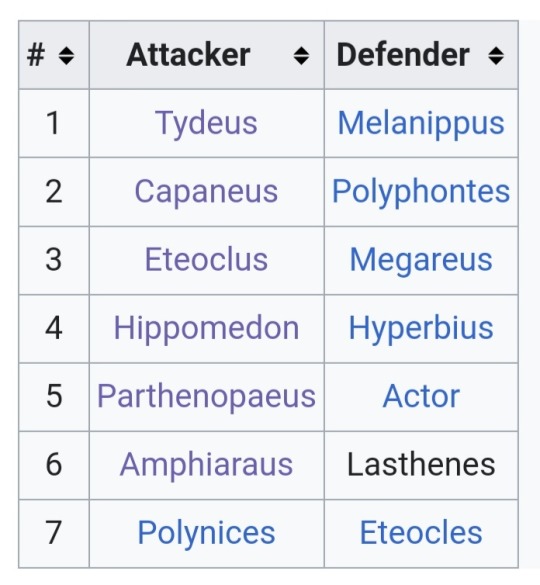
When the Scout enters, he brings news of who will lead the attack at each of the city’s gates. At the news of each opponent’s assignment, Eteocles assigns one of his men to defend that particular gate. When Eteocles is told that his brother, Polyneices, will lead the attack on the seventh gate, Eteocles decides that he will defend that gate. At this news, the Chorus warns Eteocles that he should not shed his brother’s blood, but Eteocles is beyond listening to warnings. He acknowledges the curse of his father, Oedipus, but Eteocles says that fate will determine the outcome, and if the gods are determined that he shall be destroyed, then this will happen. The chorus is dismayed at Eteocles departure and cry out that if each bother slays the other, there will be no family to see to a proper burial. The Chorus then begins to remind the audience of the story of Oedipus and the curse that followed his father, himself, and now his sons. At that moment, the Scout again enters with the news that Thebes has crushed her enemy, and the city is victorious. Six of the seven gates have withstood the onslaught of the enemy’s armies, but the battle at the seventh gate has ended in tragedy. Both Eteocles and Polyneices are dead, each at the others hand. The Scout reminds the Chorus that the city must mourn the death but also celebrate the end of the curse. The Chorus asks is they should mourn these deaths or celebrate the triumph of Thebes’ victory. With the arrival of the brother’s bodies, the Chorus acknowledges the tragedy that has unfolded. The bodies are followed closely by Ismene and Antigone, who have come to bury their brothers. The Chorus addresses the sisters, with grief and with sadness at the resolution of the curse. The two sisters respond to the Chorus with their own grief, as they lament the curse that damned both brothers. As Antigone wonders where they will bury the brothers, a Herald enters with an announcement that the council has met. The council has determined that Eteocles is a hero and will be accorded an honorable burial. However, Polyneices would have laid waste to Thebes, and thus, his corpse is to lie unburied, to be picked apart by the birds of prey. Antigone promises that she will bury her brother, as she will not be bound by the Theban council’s ruling. A brief argument with the Herald ensues, but Antigone will not be threatened, and finally, the Herald leaves to report to the council. The play ends with the Chorus divided. Half will accompany Eteocles to his grave; half will accompany Polyneices to his burial.
Aeschylus' Seven Against Thebes was part of a trilogy, along with other two tragic plays called Laius and Oedipus. Unfortunately both of them got lost, along with a comedic play titled The Sphinx. Due to the popularity of Sophocles' Antigone the ending was rewritten about half of a century after Aeschylus' death so that play could have a less mournful tone and turn Antigone into a continuation of it.
Chapter 9: Antigone
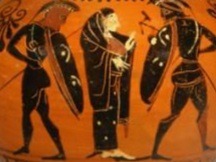
Similarly with Oedipus Rex, the tragic play Antigone written by Sophocles is one of the most precious literary creations of antiquity. Antigone, the brave daughter of Oedipus, witnesses the disaster caused by the fight between her brothers, Eteocles and Polynices. Both fell in battle, and the throne of Thebes is occupied by Creon. The king orders the funeral of Eteocles, the defender of the fortress, to be organized with pomp. For the other son of Oedipus though, Polynices even a simple burial is prohibited. Antigone, the sister of the two fighters, stood up against the harsh royal order, facing the danger of the death penalty. In great secrecy, she surrenders the body of Polynices to the earth, thus fulfilling the obligation that, according to custom, the blood connection with the dead man demands.
Antigone's deed was quickly discovered by Creon who sentences her to death. However, she is fearless in the face of death, viewing it as a release from suffering. In the heated discussion between Creon and Antigone, a sharp clash of moral principles is revealed. Antigone, the frail and tender maiden, is endowed with a bold character, with a courage worthy of a fighter. Her strength to face the king is derived from the conscience that acts in the name of the ancient, unwritten laws, which summarize the traditional morality, deeply rooted in the Greek cities. Antigone will perish in prison, but Creon, who disregarded the will of the gods, will receive a severe punishment by losing his son, Haemon (Antigone's fiance), and his wife, who commits suicide by cursing her proud and reckless husband.
Final Note
It took me waaay longer than I intitially expected to make this thing. The fact that I forgot at one point about this post didn't help either. I've also considered including the myth of the Coronides as well, but I've already talked about it many times on this blog so I decided to end it with Antigone. I'm also aware of the fact that there are different versions of the exact same myth, as well as I might have accidentally included mistakes here and there. Also also, I realized that if I don't insert any humor I'll die out of boredom while making this, hence the dry jokes. Anyway, hope you'll like it! 👍
#greek mythology#greek gods#thebes#cadmus#semele#dionysus#pentheus#sphinx#oedipus#antigone#ramblings
28 notes
·
View notes
Text
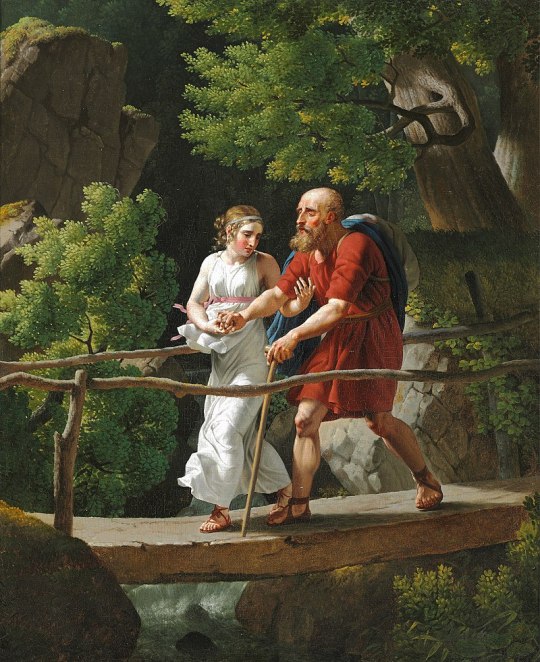
Oedipus and Antigone
Artist: Christoffer Wilhelm Eckersberg (Danish, 1783–1853)
Date: 1812
Media: Oil on canvas
Collection: The National Museum in Stockholm, Sweden
Description
In this painting of Oedipus and Antigone from 1812, Eckersberg presents a doting and concerned Antigone and an elderly Oedipus who is visibly very frail. Oedipus nonetheless shoulders the burden of carrying some heavy clothing on his back, while Antigone walks more freely, albeit while expending energy tending to her father. I love the bright colours in this scene, but also the way Eckersberg manages to capture the melancholy of both characters and the tenderness between them. On they go, in sadness, across the bridge.
In Greek mythology Antigone is a Theban princess and a character in several ancient Greek tragedies. She is the daughter of Oedipus, king of Thebes; her mother is either Jocasta or, in another variation of the myth, Euryganeia. She is a sister of Polynices, Eteocles, and Ismene. The meaning of the name is, as in the case of the masculine equivalent Antigonus, "in place of one's parents" or "worthy of one's parents".
#greek mythology#mythological painting#mythological art#oedipus#antigone#19th century painting#19th century art#landscape#danish painter#princess#trees#suspension bridge#rocks#water stream#elderly man#father and daughter#painting#oil on canvas#mythological scene#artwork#fine art#the national museum stockholm
49 notes
·
View notes
Text
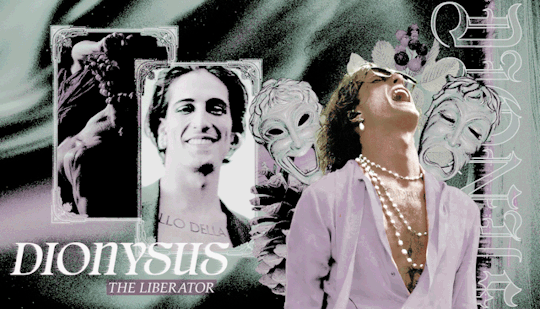
❛❛ the desire before the desire. the lick of beginning to know you don't know. if life is a stage, that is the show. enter dionysus.
defaulting to his modern/1980s NYC arc, but his background follows nonnus' dionysiaca, which considers dionysus the reincarnation of zagreus, the first-born son of hades and persephone. prophesied to overthrow zeus as the only god capable of wielding his thunderbolts, zagreus was seemingly embraced by zeus as his heir with a promise of peaceful succession. however, hera, resenting this decree, orchestrated zagreus' brutal dismemberment and cannibalization by the titans. unbeknownst to all but zeus, zagreus’ heart remained intact after the attack. hoping to reshape the prophecy, zeus fed it to the theban princess semele, making her the surrogate mother of zagreus' new incarnation: dionysus. though hera later attempted to kill semele and her unborn child ( believing it was just another bastard ), dionysus survived and was raised in secret by the maenads of anatolia ( presently eastern turkey ).
when dionysus came of age, zeus offered him a place among the olympians, but as a demigod, he could only achieve apotheosis by earning mortal worship. he chose to do so by spreading the teachings of the maenads; their customs ( which valued social freedoms and communal equality ) clashed with traditional greek ideals but quickly resonated with the oppressed masses. his cult began to disrupt the status quo in both the mortal and divine world, and though his apotheosis came at the cost of much bloodshed and strife, he was ultimately recognized not just as a god of wine and ecstasy, but as a force of transformation, rebellion, and rebirth.
✧ headcanons ✧ visuals ✧ threads
☁️ . . . MAIN VERSES
✧ modern / 1980s arc : with views too far ahead of their time, the roman edict of 186 BC called for the crucifixion and disbanding of the bacchants, resulting in dionysus' decision to finally remove himself from mortal affairs. it isn't until the turn of the 20th century that this sentiment begins to shift. by the 1920s prohibition era they start to fully immerse themselves again and establish a new temple in the form of an elusive bar called club mystes (more info here). my default for this verse is set during the 80s or anytime before, but their canon will likely not surpass the 1990s/00s unless plotted otherwise. ✧ asia minor arc : dionysus' coming of age story. by 17, zeus has finally set them on a decades-long campaign to become the first and only demigod turned olympian. during this arc, gods & kings alike have started to become aware of an alleged mortal-born god rising in the east. all interactions here take place in asia minor, where his retinue is still new and growing, mead is the libation of his worship ( wine has yet to be invented ), he doesn't know he's the reincarnation of zagreus, and has yet to be cursed with madness. by 25 he's managed to spread his cult across asia minor and is ready to set sail for mainland greece. ✧ greek campaign arc : after a victorious campaign in asia minor, hera’s curse (more info here) trapped dionysus in a beastial rage, forcing him to wander the assyrian desert for seven years. he was found by rhea, who eventually restored his senses with an amethyst amulet and taught him the art of harvest, leading to his creation of wine -- the new sacrament of his worship. rebuilding his strength and army in the isle of naxos, dionysus finally sets out for greece, where he comes in contact with the rest of the greek pantheon, seeks allies, and wages war against kings who have opposed and enslaved the bacchants. ✧ apotheosis arc : a final battle against perseus in argos (hera's patron city), ends in a stalemate and forces dionysus to earn his apotheosis by doing the impossible: journey to the underworld and complete three trials put before him by its king & queen. this verse primarily focuses on those trials, but ultimately ends in the discovery that dionysus is zagreus reincarnated. with the trials completed, he ascends as a fully initiated olympian god where he respect for his father and the rest of the pantheon quickly wanes. they choose to reside in the mortal realm, where his cult still struggles with persecution and his battle to garner respect still wages on.
☁️ . . . AU VERSES
✧ dc/comic verse : background primarily follows his main verses, except dionysus is a demigod hero akin to wonder woman rather than a full fledged deity. he was most active during ancient times and retires as a club owner by the modern age. after mysteriously losing his amethyst amulet, he went on a dissociative rampage across metropolis, killing dozens before the suicide squad subdued him. disgraced and imprisoned by A.R.G.U.S. at a task force x blacksite, research on his retrieved necklace led to the creation of an implant that mimics its connection to dionysus' mind— allowing amanda waller to direct and tranquilize him at her whim. though he aligns with many of the squad’s missions, dionysus resents his lack of free-will and suspects a.r.g.u.s. has a hidden motive for keeping a demigod under the government's control. [alt. verse] he's desire of the endless coupled with aura davina / eros ( ohkuneho ) ✧ dragon age : open to different avenues, but i like the idea of him as one of the chasind, starting as an apostate mage raised in the wilds but ultimately becoming a leading figure in the mage-templar war. as such, they'd likely be a recruitable companion during da:o and an alternate leader of the rebel mages who can align themselves with the inquisitor during da:i. ✧ pjo (canon divergent): by the 1990s dionysus becomes the head counselor of camp halfblood, albeit begrudgingly. the reason why zeus exiles him to babysitting duty varies, but despite being far from his prime, he's more than qualified to train the current demigods to fight off monsters and save the world. if we incorporate his daughter renata into the plot, then dionysus eventually dies after sacrificing himself for her resurrection.
☁️ . . . DOSSIER
name. dionysus epithets. lysios / liber ( the liberator ), bakkhos ( of the bacchic frenzy ) bromios ( the boisterous ), omestes ( devourer of flesh ), mainoles ( the mad, raging one ) , dimetor ( the twice-born ) pronouns. he/they, (non-binary, male presenting) titles. god of wine, revelry, ecstasy, madness & theatre. cult leader of the maenads & satyrs. heir of olympus. age. ~3375 birthdate(s): spring equinox ( mar. 21, 1350 BCE. -- when he was born as zagreus ); winter solstice ( dec. 25 , 1353 BCE. when he was re-born as dionysus) origin. thebes, greece etymology. olympian / chthonic god , demigod ( verse dependent ) sexuality. pansexual alignment . chaotic good / neutral relations. semele (surrogate mother), zeus (surrogate father), persephone (mother), hades (father), ariadne (wife) height. 5'10" build. slender , athletic , the power & grace of a ballet dancer hair. dark brown , soft & curled, typically shoulder length eyes. wine-dark & sultry, deep red-violet scars. quite a few from his warring as a demigod, but after his ascension these became very feint and unnoticeable unless closely inspected scents. grape, pine sap, myrhh, lavender, honey
☁️ . . . ABILITIES / SKILLSET
* botantical manipulation : can create, shape and manipulate plant life, including vines, wood, moss, fruit, leaves, flowers ect. ; cause plants to grow or decay; use plant chemicals to heal or poison ; animate vines, thorns, & other plants to attack enemies. * seductive magnetism : radiates a supernatural beauty & attractive aura, naturally inducing pleasure and desire while subtly lifting inhibitions ; affected targets are more inclined to be persuaded, or lessen their desire to physically harm him. ( think pentheus & the pirates ) * mind possession / manipulation : possesses the minds of any living being / groups of beings, manipulating their actions, motor senses and / or perceptions of reality ; can be used to invoke self - destructive madness, or empower ( only temporary and most potent after ingesting his wine ) * ecstasy/pleasure manipulation : manipulates pleasure responses ( whether mental, spiritual, physical, social, sexual ect. ) ; induces targets with either extreme bliss or painful discomfort, usually through physical touch, mental possession, or ingestion of his wine. * anarchy manipulation . invokes an absence or lack of government / social restraints over a large radius, ranging from a single person to small villages to large cities, creating riotous behaviors, rebellion, social disorder & disruption. * beastial transmutation . transmutates into the form of predatory beasts, typically a wild cat or serpent ; can also invoke beastial characteristics unto others ( usually the maenads , which is where they get their superhuman strength, claws, and hunger for raw flesh ).
☁️ . . . RESTRICTIONS / WEAKNESSES
* hera's curse . leaves him in a permanent state of "madness" wherein he has no better sense of self or reason than a predatory beast. his bloodlust and destructive impulses will take over unless he's wearing his amethyst necklace. the curse also gives him an appetite for raw flesh. with the necklace, this appetite remains the same albeit controlled. he can eat other foods to blend in, but only meat truly sustains him. to go without for long periods would weaken him and put a damper on his necklace's effect over his beastial impulses. * harmonia's curse . as a way of punishing aphrodite and ares, hephaestus gifted their daughter harmonia a cursed necklace on her wedding day, intended to bring tragic misfortunes not only to the wearer, but her entire royal lineage. so many famous greek tragedies take place in thebes for this very reason ( i.e, the bacchae, antigone, and opedipus rex). tragedy has always followed dionysus and usually manifests in the death of his mortal loved ones, or the constant persecution and slaughter of his retinue. fate will always find a way to counterbalance his wins and can function as a deterrent in some situations. * battle strategy . historically, alexander the great considered dionysus his military idol and spent all his life trying to surpass his success, so this isn't meant to discredit his prowess in battle, but i see dionysus' military success largely due to the unified pack mentality and unflinching, unrelenting brutality of his army more so than strategy. the fact that perseus was the only opponent to bring him to a stalemate by way of cleverness ( using medusa's head to turn him into stone ) speaks to this, and big-brained ariadne ( or a similar strategist at his side ) is the only reason why he didn't die that day. * mortal-born weaknesses . dionysus bleeds red like a mortal prior to apotheosis and then a wine red-violet afterwards instead of golden ichor. consumption of his blood can grant a fraction of his abilities, and although he is immortal and cannot be killed in the usual sense, his mortal origins and the sharing of his power in group combat settings make him less impervious to injury than most gods -- significantly so during their years as a demigod. his training is what he really depends on more so than a godlike infallibility.
☁️ . . . ADDITIONAL NOTES
the thiasos . the general term for dionysus’ ecstatic retinue is the thiasos which consists of the maenads, the bacchants, satyrs, and sacred animals who almost always accompany him in his travels and arrival to different city-states like a procession. those who are willing and able to fight also serve as members of dionysus’ army in battle.
the maenads . the maenads are the most significant and trusted members of the thiasos, consisting primarily of women. they serve as high priestesses, leading the thiasos in dionysus’ absence or alongside him. they also serve as the generals of dionysus’ armies. the maenads originally consisted of dionysus’ nurses, anatolian nymphs similar to the amazons. the rest of the maenads consist of women the thiasos have come across who have joined them & shown their loyalty & aptitude for leading the cause as an equal to dionysus.
the bacchants . the general term for members of the thiasos, so basically anyone who is not a maenad in the group is considered a bacchant. these consist of people and immortals from all walks of life who have either fled from oppression and found sanctuary in the group, or who sympathized for humanity's plight and want to assist in the movement towards a more equal greece. meaning, dionysus is not solely followed by women, he is followed by slaves, foreigners, elite citizens, nymphs & other immortals alike.
bacchanalia / dionysia . the official name for the greco-roman gatherings and celebrations held in dionysus’ honor. these often include drinking , dancing , ecstatic trance and fornication, sparagmos rituals, omophagia rituals, theater competitions, and just an overall communion with other worshippers of dionysus.
sparagmos . the greek word means “ to tear apart or render ” and it is one of the central rites of the cult, meant to symbolize dionysus’ death as zagreus when the titans ripped him to pieces in the form of a bull. similarly, in a bacchic frenzy his followers are given the supernatural strength to render an animal, usually a bull, to pieces, or even a human if one should have particularly threatened or offended the thiasos. pentheus and orpheus were victims of sparagmos. this ritual came to pass only after dionysus was cursed with madness and discovered his chthonic origins.
omophogia . following sparagmos comes omophagia “ the eating of raw meat / flesh ” dionysus’ curse has given him an appetite for raw flesh, so following a sparagmos ritual, his followers offer the remaining flesh to dionysus for consumption. however, sharing in dionysus’ power also means sharing his curse, so the maenads sometimes engage in omophagia as well. it's treated as a sacred act because following zagreus’ dismemberment, semele consumed his heart, and so omophagia serves as a symbol of rebirth / redistribution of matter where sparagmos symbolizes death.
8 notes
·
View notes
Text
Descendants name headcanons;

Elle Athanasiou (daughter of Prince Eric and Ariel).
Arabella Athanasiou (niece of Prince Eric and Ariel).
Henry (de Vil) Crowley (the kid with white hair that may or may not be related to Carlos from Carlos' Scavenger hunt).
Hayden 'Hadie' Athanasiou.
Hyllus 'Herkie' Amphitryon Tiryn-Theban-Athanasiou of Argolis.
Benjamin 'Ben' Florian Léandre.
Maleficent Bertha Fae || turns to Malanie 'Mal' Bertha Fae-Athanasiou || when she is able to change her name.
Princess Geneviève ‘Evie’ Evelyn Grimhilde-Westergaard Of The Southern Isles.
Jakeem 'Jay' Al-Jazira.
Jadeana 'Jade' Al-Jazira.
Harrison 'Harry' Hook.
Chadwick 'Chad' Charming.
Audrea 'Audrey' Rose.
Uma Athanasiou.
Jehanne 'Jane' Fae.
Li 'Lonnie' Lan-Lei.
Li 'Li Shang Jr/Lil Shang' Shaiming.
LeFou Deux 'Lee' Beaumont.
Pino 'Pin' Liddell.
Allison 'Ally' Liddell.
Gillian 'Gil' LeGume.
Gaston 'Bronze' Legume III.
Gaston 'Junior' Legume Jr.
Frederique 'Freddie' Facilier.
Cecelia 'Cecelia' Facilier.
Rubina 'Ruby' Fitzherbert.
Ginevra 'Ginny' Gothel.
Diego Ramirez-de Vil.
Richard 'Rick' Ratcliffe.
Samson 'Sammy' Smiegel.
Skipper 'Squeaky' Smiegel.
Sterling 'Squirmy' Smiegel.
Claymore 'Clay' Clayton.
Madeleine 'Maddy' Mim.
Reza Vizer of Agrabah.
Harold 'Harry' Badun.
Jason 'Jace' Badun.
Yzla Sorcerer of Enchancia.
Zevon Sorcerer of Enchancia.
Yaz 'Lil Yaz' Sorcerer of Enchancia.
Tiger Poeny Rossí.
Hermione 'Hermie' Bing.
Blake 'Big Murph' Murphy.
Edmund 'Eddie' Balthazar.
Opal Facilier.
Douglas 'Doug' Bergmann.
Derek Bergmann.
Robert 'Bobby' Hood of Locksley.
Artorius 'Artie' Pendragon.
Drizella 'Dizzy' Tremaine-Westergaard of the Southern Isles ||.
Jedoun 'Jordan' Ayad.
Aziz Bint Aladdin Bin Cassim Al Hamed of Agrabah.
Sophie White.
Glauco White.
Daniel 'Danny' Darling-Cooper of Darling Coast.
Róisín 'Red' Hearts.
Zhu Yi-min (based on @queercendants ' naming post).
Arabella Athanasiou of Tirulia.
Melody Athanasiou of Tirulia.
More to be added if I can think of any more first and last names.
@cleverqueencommander thanks for the help coming up with Elle's new last name!
#descendants#disney descendants#disney#descendants au#melissa de la cruz#wicked world#disney descendants au#headcanons#canon revamp#canon? who's she?#etc
58 notes
·
View notes
Text
Ever since the founding of Thebes, it was rare for its princesses to leave its walls. If it had been up to her father, Megara would have stayed, too, but there was one thing even Kreon knew. If Megara wanted to leave, she would.
Incidentally, the only thing that got her out of the city was a chance to cheer for her high school. The curse on Thebes did not extend to athletic competitions, so in view of their inability to win a war, every school in the city was eager to send their young men off. And if young men from the most turbulent Greek city state had to rush off and represent their polis, they would do it with all the finest cheerleaders.
Since Thebans had a reputation for terrible luck, they approached Athens in a series of wagons while pretending they had any shot in Asphodel of returning with a laurel. On the plus side, Megara reasoned to her fellow cheerleaders, at least they got out of Thebes.
@blackskiesbeautifultimes
236 notes
·
View notes
Text
Erimenthe, Goddess of Fragility and Presentation.
•
♡

Also known as the lover of Athena.
Initially a mortal Theban princess, Erimenthe was later gifted godhood as a result of her fragile yet delicate nature and loyal spirit. She’s loyal to Athena, whom Erimenthe swears to support for eternity.
As a goddess, Erimenthe represents the fragile things in life and is said to love giving and receiving gifts. She is also said to be very grateful, especially as she was gifted godhood.
Some say she may smite those who are greedy or immoral in nature, especially ruthless rulers..
(I originally wanted her to be the goddess of mercy and modesty, but those are already taken in mythology so…)
♡
•
#disney hercules#disney's hercules#hercules the animated series#disney oc#self insert#oc x canon#s/i x canon#finally found a good color scheme for her goddess form
11 notes
·
View notes
Text
Dionysus (Bacchus): The God of Wine and Fertility in Greek Mythology
Dionysus was the last god to enter Olympus. Homer did not recognize him. There are no early sources for his story other than some brief allusions in Hesiod, in the eighth or ninth century. A later Homeric hymn, perhaps as late as the fourth century, gives the only account of the pirate ship.
Birth of Dionysus in Thebes
Thebes was the city of Dionysus himself, where he was born the son of Zeus and the Theban princess Semele.
Only in Thebes did mortal women bear immortal gods.
Semele's Tragic Fate
Semele was the most unlucky of all the women Zeus fell in love with, and the reason for her condition was also Hera. Zeus was madly in love with her and told her that anything she asked of him he would do; he swore an oath to her by the River Styx, an oath that not even he himself could break. She told him that what she wanted above all was to see him in all his glory as King of Heaven and Lord of Thunderbolt. It was Hera who put that wish in her heart. Zeus knew that no mortal could see him like that and live, but he could do nothing. He swore by the Styx. He came as she asked, and in front of that terrible glory of flaming light she died. But Zeus took her child, who was about to be born, and hid it in his side, away from Hera, until it was time for it to be born. Hermes then carried him off to be cared for by the nymphs of Nyssa, but no mortal has ever seen Nyssa or knows where it is. Some say that the nymphs are the Hades, which Zeus then placed in the sky as stars, the stars that bring rain when they approach the horizon. Thus, the god of the vine was born from fire and nurtured by rain, the intense scorching heat that ripens the grapes and the water that keeps the plant alive. After reaching maturity, Dionysus traveled to exotic places.
The gold-rich lands of Lydia, Phrygia too, the sun-baked plains of Persia, and the great walls of Bactria. And the storm-swept Medes.
Encounter with Pirates
Everywhere he taught the people the culture of karma and the secrets of his worship, and everywhere they accepted him as a god until he came close to his own country
One day over the sea near Greece, a pirate ship sailed ashore and on the shore they saw a handsome young man whose black hair fell over a purple cloak that covered his strong shoulders. He looked like the son of a king, a young man whose parents could afford to pay a large ransom. The sailors rushed ashore and grabbed him. On the deck of the ship they brought rough ropes to tie him up, but to their surprise they could not tie him up, for the ropes would not hold together and would break when they touched his hands or feet. He sat looking at them with a smile in his black eyes.
The ship's captain alone among them understood and shouted that this must be a god and should be released at once or they would be mortally wounded. But the captain mocked him as a silly fool and ordered the sailors to hurry up and hoist the sail. The wind filled it and the men pulled on the taut sails, but the ship did not move. Then wonder after wonder happened. Fragrant wine flowed in streams on the deck; a vine with many clusters spread over the sail; a dark green ivy plant wrapped around the mast like a hoop, with beautiful flowers and fruits. The terrified pirates ordered the helmsman to head for land. But it was too late: while they were talking, their captive had transformed into a lion, roaring and roaring terribly. The pirates jumped into the sea and immediately turned into dolphins, all but the good helmsman. The god was merciful to him. He grabbed him and told him to take heart, for he had found favor with the one who was already a god - Dionysus.
To read the full article, click on this link
Dionysus (Bacchus)
#hannibal#murder husbands#hugh dancy#nbc hannibal#neil gaiman#good omens#the sandman#undertale#witchcraft#greek gods#greek mythology#ancient greece
5 notes
·
View notes
Text

Dionysus Greek god of wine, fertility, and vegetation, god of the theater. Son of Zeus and Semele, the Theban princess. Vía https://www.thattheworldmayknow.com/define-dionysus
13 notes
·
View notes
Text
MEGARA // PRINCESS OF THEBES
“She was a Theban princess and the first wife of the hero Heracles. Hera sent Heracles into a fit of temporary madness due to her hatred for him. In his madness, Heracles killed their children either by shooting them with arrows or by throwing them into a fire. Whether Megara also died as a result of this attack depended on the author. Heracles' desire to atone for the murders of his wife and children is typically cited as the catalyst for becoming a slave to his cousin Eurystheus and performing the Twelve Labours.”

(depiction of an insane Heracles killing their son while Megara (right) watches in horror)
0 notes
Text
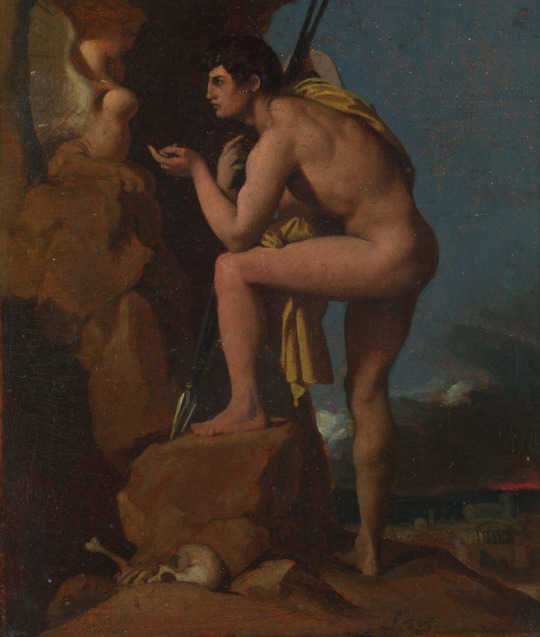
Jean Auguste Dominique Ingres (French, 1780 - 1867) Oedipus and the Sphinx, 1808 National Gallery, London Oedipus, a figure from Greek mythology, stands nude and in profile before the Sphinx, who guards the entrance to the ancient city of Thebes. The Sphinx – a monster with the face, head and shoulders of a woman, a lion’s body, and bird’s wings – asks Oedipus to solve the riddle she poses to all travellers seeking to enter the city: ‘What has a voice and walks on all fours in the morning, on two at noon, and on three in the evening?’ Oedipus correctly answers that it is man who crawls on all fours as a child, walks on two legs as an adult, and uses a walking stick as a third leg in old age. The bones of a previous traveller, killed by the Sphinx for having failed to solve the riddle, lie at the bottom of the picture. Thebes is visible in the distance on the right.
The theme of a monster defeated by human intelligence clearly appealed to Ingres. The picture also complements another of his paintings, Angelica saved by Ruggierro, which shows a chivalrous knight attacking a sea monster to save a princess. But this is also a painting of a man facing his destiny, as Oedipus’s actions will lead him to become King of Thebes, as the oracle predicted at his birth, and to unknowingly marry his own mother, Jocasta. This unwitting tragedy and its consequences is the drama of Oedipus Rex, the middle play of Sophocles' Theban Plays.
This painting is a later, and smaller, version of one painted in 1808 and subsequently reworked in 1827 (Louvre, Paris). The first version of Oedipus and the Sphinx was essentially a figure study that Ingres painted while studying at the French Academy in Rome. It was sent to Paris to be judged by members of the Institut de France. As required by the Institut’s rules, the figure of Oedipus was based upon a live model, although the pose was derived from the classical statue, Hermes Fastening his Sandal (Louvre), a Roman marble copy of a lost Greek bronze. Oedipus’s body is presented as an arrangement of geometrical shapes; for example, the triangle formed by his left arm, thigh and chest is mirrored and inverted by his left upper arm and forearm. The use of profile for both Oedipus and the Sphinx, together with the shallow space in much of the picture, recalls classical friezes and ancient Greek vases, which Ingres used as the sources for his deliberately classical artistic style.
#Jean Auguste Dominique Ingres#French art#mediterranean#art#fine arts#1800s#fine art#european art#classical art#europe#european#oil painting#europa#mythology#mythological art#classical#Oedipus and the Sphinx#1808#painting#artwork
118 notes
·
View notes
Note
Hi, would you be OK with sharing a source for the photos you used for your edits on Queens and Princesses of Greek Mythology (the one that was for Hera, Antigone, Medea, Clytemnystra, Andromeda, Helen, Persephone) and the Theban plays? I'd love to make edits using some of them for some book series characters. (Btw, I first saw your edits years ago and I just wanted to add that they're really beautiful. They were so nice they got me back into Greek Mythology at some point in high school - and I never thought I'd get back into it after my initial obsession in middle school ran its course).
I don't have all the sources for the photos in those two edits anymore. Hera is Naomi Campbell by Mert & Marcus (2014). There's a full image of the Antigone photo on Pinterest here. Thank you for the nice message. I'm sorry that I couldn't help you out more.
1 note
·
View note
Text
That moment when you remember that Megara, the first wife of Heracles, was a Theban Princess and the daughter of Creon.

6 notes
·
View notes
Text

Teiresias, the blind prophet of Thebes, once spoke to the princesses of his accursed city-state, warning them that the Fates had destined some of them to die for love. Megara swore to herself that would never be her. Like so many Theban tragedies, death befalls those who fight their fate. In her servitude to Hades, she's lost hope, but Teiresias never warned her about Hercules.
My secret's out! Anyone interested, I hope you enjoy it!
8 notes
·
View notes
Text
* herakles: blood-stained champion.
basic-ass profile series.

portrayal notes.
Herakles the Lionhearted, son of Zeus. Culture Hero. God. Murderer.
Vibes-based portrayal while I pin down the various tales that make up the man, the myth, the legend of Herakles. Currently mainlining The Oxford Handbook of Heracles ed. by Daniel Ogden to get my bearings.
Themes centered on the meaning of heroism and violence and what happens when the bigge damn hero is more terrifying than the monsters he slays.
Interested in exploring the fall of a hero :’) (but a hero should rise before he falls, yes?)
Tertiary, Pre/Epic Cycle. Verses include (but not limited to) myth canon, myth AU, modern, and uhhh… Just about anywhere I can slot him in tbh.

basics.
Alkaios of Thebes Herakles God of Strength and Heroes; Divine Protector of Mankind, Patron of the Gymnasium Theban-born, but of Mykenai heritage (Tyrins, Troezen) / Aegan Of white, Black, and mixed indigenous Mexican descent in non-myth verses Pre/Epic Cycle
appearance.
His aura is what's larger than life — the man himself is on the taller side for a man of his era, but hardly the towering height most people imagine based on his exploits.
Bronzed bc regardless of the existence of sunscreen, he's not gonna wear it. Dark brown hair, curled and thick. Dark eyes that would never be called cow-like.
A thick dark beard and plenty of body hair as well. If he were a mortal man who changed and aged over time as one, he'd be one hell of a bear. Or, well, "dad bod" for those who aren't MLM.
relationships.
DIVINE HERITAGE: Zeus (father; grandsire); Hera NOTABLE ANCESTORS: Perseus PARENTS: Alcmene of Mykenai and Zeus (divine); Aphitryon (mortal); Rhadamanthus (stepfather) SIBLINGS: many divine siblings by his divine father; Iphikles and Laonome SPOUSE: Megara, princess of Thebes; Omphale, queen of Lydia; Deianira, princess of Calydon; Hebe, goddess of Youth LOVERS: enough of them that I need time to collect a list of names and make a separate headcanon post. CHILDREN: Some say there are over 100. Tbf some of those are now dead. CONNECTIONS: honestly? Probably everyone.
personality.
The duality of Heracles is that he is both the best and worst person you could ever meet. He’d literally go to Hades and back to repay what’s a relatively small favor.
He’s also known for impulsive acts of great violence, both in infancy (against the snakes Hera sent to his crib) and in adolescence (the murder of his music teacher, Linus)
He can be extremely generous and exceedingly loyal, boisterous drinker and a genial guest.
He is also violent, arrogant, and impulsive. He is intolerant to the faintest slight and is capable of extreme brutality.
Awful in both senses, inspiring awe and dread.
need to know.
Typical ancient Greek male sexuality in that he has his wife and then both male and female lovers. Less important than the gender of his partners is that he’s (usually) the top.
Only Omphale has had the honor of topping Herakles in his whole dang life.
Grew up possibly in Thebes???
Timeline goes: some adventures > marriage to Megara > some adventures > madness and murder of family > 12 Labors in part to cleanse his soul of miasma of his murders > more adventures.
There’s so much to know lkajsf;fsdaasfd
I’ll update this when I know what’s the most need-to-know
1 note
·
View note